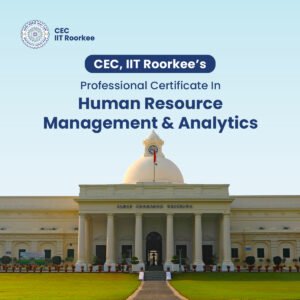Last updated on June 25th, 2024 at 01:31 pm
Human resources (HR) specialists are workforce management professionals who accomplish various duties pertaining to hiring, compensation, benefits and training, and employee relations. These professionals are inevitable in contributing to organisational success.
They monitor all Human Resource functions, including recruitment, benefits, and compensation. The profession of human resources specialists is estimated to increase by 6% from 2022 to 2032, which is quicker than the average for all professions. These aspects suggest that HR specialists are quite in demand!
Working as an HR specialist allows you to create powerful organisational cultures. Typically, becoming an HR specialist needs to have HR qualifications, which include a bachelor’s degree in a pertinent field, like business or HR, and relevant work experience. The key skills required to become an HR specialist include problem-solving, communication, and ethics.
But one often asks, , “How to become HR?” and “What does an HR specialist do?” So let’s first introduce you to the key responsibilities and then delve into the details of how to become HR specialist.

Key responsibilities of an HR Specialist:
- Creating and reviewing benefits and compensation packages
- Managing health and life insurance programs
- Creating training and development plans
- Notifying employees about supplementary benefits they are qualified for
- Predicting hiring requirements and ensuring the recruitment process operates flawlessly
- Updating employee records with the latest hire details and/or modifications in employment status
- Handling and responding to employees’ queries timely
- Maintaining organisational charts, job descriptions, and salary records
- Planning and implementing HR policies in all departments of an organisation
How to Become HR Specialist?
Following the below steps will help you to flourish in your career and give you the answers on how to become HR specialist with the HR qualifications needed:
Obtain a bachelor’s degree in an applicable field:
Usually, HR specialists own bachelor’s degrees in disciplines like human resources, business administration, psychology, management, or other pertinent fields. The first step in the roadmap on how to become HR specialist is to earn a bachelor’s degree by pursuing a Human Resource Management course.
Gain practical experience through internship:
You can pursue internships to obtain on-the-job experience and training in the field while working. In this context, you can volunteer as an HR liaison or work with a local organisation.
Grow your professional network:
It is vital to create your professional network by connecting with professionals in this field. During your bachelor’s final year, you can try expanding your network by several means. These include contacting your school’s alumni, attaining membership in professional organisations, or approaching other budding HR specialists.
Gain professional experience:
Attaining professional experience is important to qualify your role as an HR specialist. You can work in people-centric positions with identical responsibilities, for example, customer service. Professional work experience can increase your chances of getting a job in relevant job roles.
Obtain relevant additional certifications:
Although it’s optional, earning additional certifications can effectively shape your career. Earning relevant HR courses highlights your professional competency and dedication. It also improves your credibility with employers. Consider enrolling in an HR certificate program to further boost your HR qualifications.
Consider obtaining a Master’s Degree:
Obtaining a master’s in an HR manager course helps students to specialise in specific HR functions. It imparts advanced, specialised knowledge and cutting-edge technical HR skills. Usually, the curriculum of a master’s degree in HR focuses on imparting management and leadership skills. Also, it covers business foundation courses like accounting, finance, and core HR coursework.
Amass experience:
It is recommended to begin in an entry-level HR position, like an HR assistant or coordinator, to obtain hands-on experience. Subsequently, you can progress to roles like manager, director, and Chief Human Resources Officer (CHRO).
Conclusion
All these pointers above answer the question of how to become HR specialist. It is not just about fulfilling the job responsibilities but also about facilitating success for the organisation. In addition to policies and procedures, HR specialists focus on workforces that are integral parts of the organisation. To ensure a progressing career graph as an HR specialist, make sure to continuously network, attend workshops and HR seminars, and stay abreast of industry trends.
Check out the Certification Program in Human Resource Management and Analytics CEC, at IIT Roorkee, provided by Imarticus, to acquire cutting-edge HR skills and claim exciting career opportunities! This 6-month IIT Roorkee HR analytics course is designed to equip the participants with the knowledge and abilities they require to successfully manage human resources in a competitive business environment. It encompasses varied topics, namely tactics for hiring, training, retaining employees, performance management and appraisal, etc. The program provides hands-on training and an immersive learning experience. By covering all the essential and trending topics relevant to HR management, this program is set to elevate your career graph!

